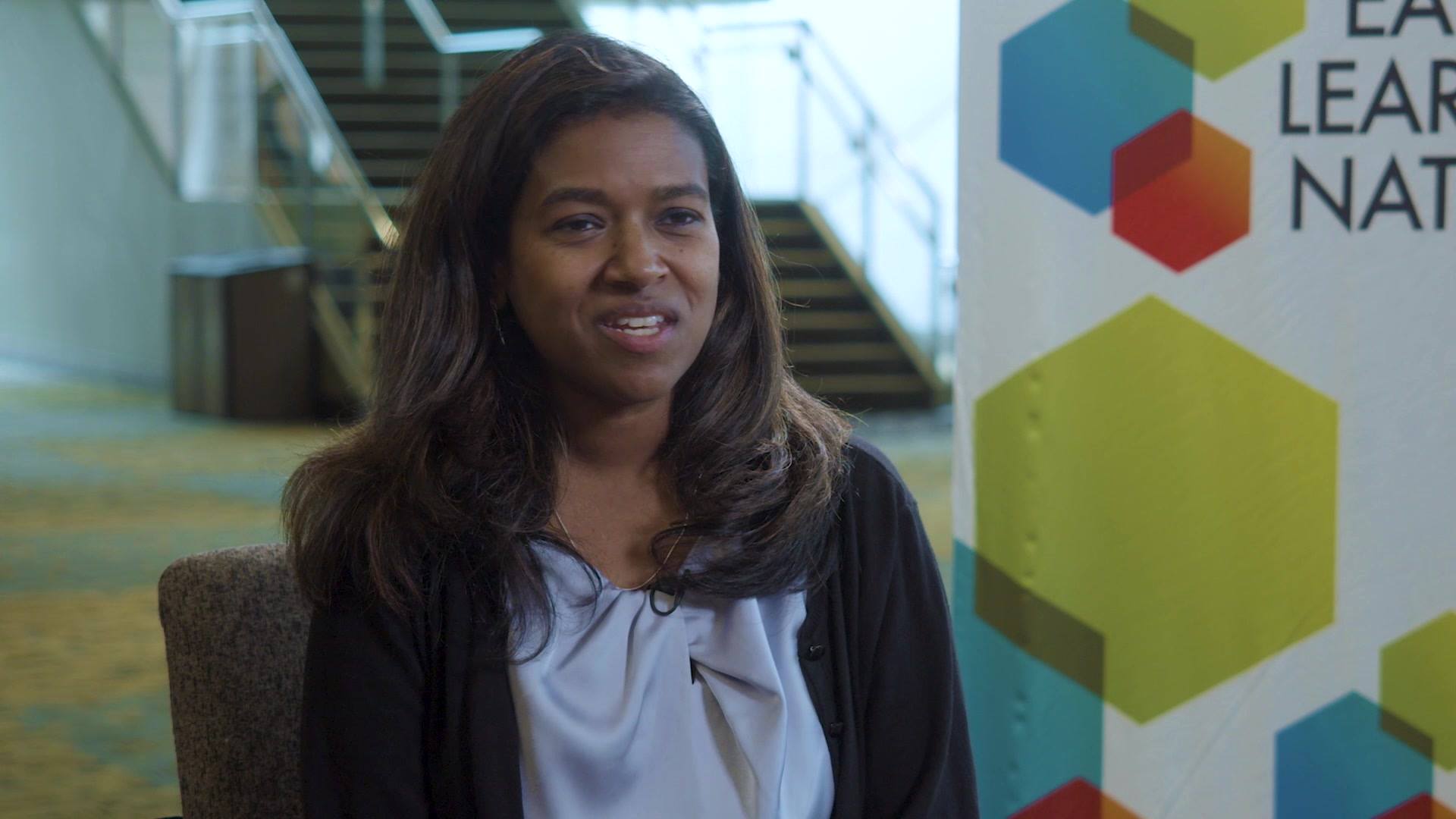Editor’s Note: The Early Learning Nation Studio recently attended the Society for Research and Development’s biennial meeting, where we spoke with early learning researchers, policymakers, and practitioners. The full collection of video conversations can be found here.
When University of Maryland Associate Professor Geetha Ramani and her colleagues visit early learning classrooms, they’re known as the “game people.” Ramani’s research shows not only the importance of teaching math skills, but also the effectiveness of what might seem like an obvious tactic: Make it fun. Filmed for Early Learning Nation’s Mobile Studio at the Society for Research in Child Development’s biennial meeting in Baltimore, MD, on March 22, 2019. #SRCD19
Transcript:
Chris Riback: Geetha, thank you for stopping by our ELN studio.
Geetha Ramani: Thank you for inviting me.
Chris Riback: In an email exchange with me before this conversation, you described yourself: “Most of my research focuses on play, games, and shared activities on children’s mathematical development.” Play, games, and shared activities, I assume this makes you the fun scientist?
Geetha Ramani: That’s right. Oftentimes when we go to schools, we’re known as the game people. A lot of the research we do involves bringing games into classrooms, and trying to promote children’s number skills. Our goal is to really have children and teachers understand, promoting math skills involves fun activities, playing games that are focused on numbers, and not necessarily worksheets and flashcards.
Chris Riback: Why math? I mean, there are folks who specialize in play generally, and they’re folks who specialize in math generally; you’ve really hit the intersection of the two. What connected those two for you?
Geetha Ramani: A plethora of research has shown now, that early math skills lay the groundwork for later math skills. There’s research that shows that skills developed before children even get to kindergarten can predict their math achievement in later elementary school and even beyond. Having a solid foundation in math is really important.
Geetha Ramani: Our goal with play, is trying to really promote these skills in an engaging way that’s sustainable, and have children really love math.
Chris Riback: Are these interactions and games that only work or are meant primarily for practitioners, and in school or organized environments? Or are these things that parents can do, caregivers can do with kids at home?
Geetha Ramani: There are things that parents can do at home. Recently we’ve been doing research that’s involved sending math games home to families, especially families from lower income backgrounds. Just to give them some practice and materials, that they can engage in with their child, and other members of the family as well.
Chris Riback: Is part of the role, maybe the challenge, helping parents feel confident in that capability as well?
Geetha Ramani: That’s exactly right. We don’t want to add another thing for families to do. The idea is to show that math is in everything that they are already doing. So, providing games that they can play, before they go to bed or during downtime is something fun and engaging, and not necessarily something that they have to add another thing to their list.
Chris Riback: What is the Early Childhood Interaction Lab, and how does it work?
Geetha Ramani: That’s the lab that I direct, and it involves graduate students and undergraduate students at the University of Maryland in College Park. The goal of our research is just what you described, and engaging families, and teachers and students in early activities, to help them promote their early math and problem-solving skills.
Chris Riback: Let’s talk about some of your current research, because we all want to know what you’re doing now.
Geetha Ramani: Sure.
Chris Riback: I understand you have a project funded by NSF, investigating the benefits of tablet games on children’s math, and working memory development. Tell me about that.
Geetha Ramani: So we know that tablets are everywhere now. I think a recent survey found that, for children under eight, 80% of children have access to their own tablet, computer or a smartphone; there’s 100,000 apps that you can download for education purposes. The problem is, we just don’t know if they actually help any kind of skills.
Geetha Ramani: Our goal is to develop games, based on theory and empirical work. To try to develop games that actually can help children’s math and cognitive skills. That’s what we’re doing in this research. We find if you played the games that we’ve designed for about 10 minutes over two weeks, it can have lasting effects for at least a month on their math and working memory skills.
Chris Riback: Now, you also have a project with family engagement in with card games and family. You’re not just all digital.
Geetha Ramani: No, that’s right.
Chris Riback: You’re analog, too.
Geetha Ramani: That’s right. Especially with games for sending home, we want families to be interacting. We find card games are something that’s already really popular, and something that lots of people can get involved in; just not one parent and one child. It’s a really a nice activity to bring folks together.
Chris Riback: And just to close out Geetha, tell me about you. What brought you to this area of research? Was it the math, or was it the games?
Geetha Ramani: It’s really the play part. That’s what brought me. I mean, my doctoral work, years ago, was on play. We talk about it promoting cognitive skills, but I didn’t think there was a lot of great research really showing that. Math seemed to be a good intersection to show that play. Games can be a really nice way to promote a really important cognitive skill, which is early math development.
Chris Riback: Okay. Math equals play. Maybe we’ll do a bumper sticker.
Geetha Ramani: Okay. That sounds great.
Chris Riback: Thank you for coming by the studio.
Geetha Ramani: Thank you for having me.



